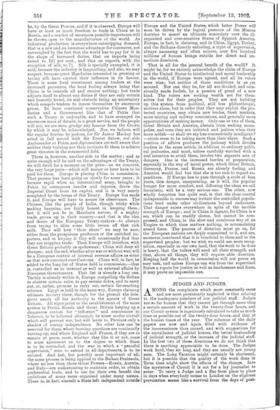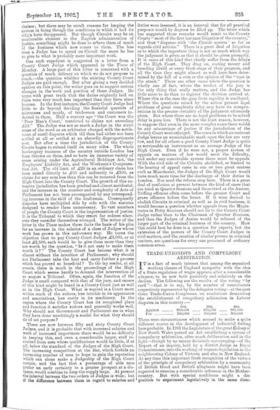JUDGES AND J UDGES. A MONG the complaints which most constantly recur
and are most persistently neglected is that relating to the inadequate numbers of our judicial staff. Judges are so far human that they cannot get through mme than a certain amount of work in the twenty-four hours, and our Circuit system is ingeniously calculated to take as much time as possible out of the twenty-four hours, and that at the busiest times of the year. The columns of the daily papers are now and again filled with evidence of the inconvenience thus caused, and with suggestions for the curtailment of judicial leisure, the better husbanding of judicial strength, or the increase of the judicial staff. In the first two of these directions we do not think that there is anything appreciable to be done. The Judges work hard, they sit long, and they are usually not young men. The Long Vacation might certainly be shortened, but it is possible that the quality of the work done in Term time might show the effects of the change. Into the mysteries of Circuit it is not for a lay journalist to enter. To carry a Judge and a Bar from place to place in days when everybody comes to London on the slightest provocation seems like a survival from the days of post- chaises ; but there may be occult reasons for keeping the system in being though the conditions in which it had its origin have disappeared. But though Circuits may be an unalterable element in the English administration of justice, something might be done to relieve them of much of the business which now comes to them. The less time a Judge has to spend on Circuit the more he has to give to what is probably more important work.
One such expedient is suggested in a letter from a County Court Judge which appeared in the Times of Monday. A large part of this letter is concerned with a question of much delicacy on which we do not propose to touch,—the question whether the existing County Court Judges are paid enough. But after giving a very decided opinion on this point, the writer goes on to suggest certain changes in the work and position of these Judges. He urges with great truth that the duties originally laid on them were very much less important than they have since become. In the first instance, the County Court Judge had little to do beyond deciding the financial quarrels of mistresses and maids, of tradesmen and customers in- debted to them. Half a century ago "the Court was the Poor Man's Court,' restricted to claims not exceeding £20." The Judge was not so much a Judge in the strict sense of the word as an arbitrator charged with the settle- ment of small disputes which till then had either not been 83ttled at all or settled at an absurdly disproportionate cost. But after a time the jurisdiction of the County Courts began to extend itself on many sides. The whole bankruptcy business of the country outside London has been thrown on them, and so have an immense variety of cases arising under the Agricultural Holdings Act, the Employers' Liability Act, and the Workmen's Compensa- tion Act. The old limit of .220 in an ordinary claim has been raised directly to £50 and indirectly to £100, as claims for any sum less than this can be removed from the High Court into the County Court. The growth of this ex- tensive jurisdiction has been gradual and almost accidental, and the increase in the number and complexity of Acts of Parliament has not been accompanied by any correspond- ing increase in the skill of the draftsman. Consequently disputes have multiplied side by side with the statutes designed to render them unnecessary. To vast numbers of people the County Court is the impersonation of justice. It is the Tribunal to which they resort for redress when- ever they consider themselves wronged. The writer of the letter in the Times makes these facts the basis of his plea for an increase in the salaries of a class of Judges whose work has grown in this unforeseen way. He turns the objection that to pay County Court Judges .£3,000, or at least £2,500, each would be to give them more than they are worth by the question, "Is it not easy to make them worth it ? " The County Court has become what it is almost without the intention of Parliament ; why should not Parliament take the hint and carry further a process which has proved so beneficial ? To the lay reader, at all events, there is much in the proceedings of the High Court which seems hardly to demand the intervention of so august a Tribunal. Often, again, the function of the Judge is small compared with that of the jury, and causes of this kind might be heard in a County Court just as well as in the High Court. What is wanted is a Court more within reach of the suitors, less terrible in its appearance and associations, less costly in its machinery. In the region where the County Court has its recognised place and function it satisfies suitors and generally works well. Why should not Government and Parliament see in what they have done unwittingly a model for what they should do of set purpose ?
There are now between fifty and sixty County Court Judges, and it is probable that with increased salaries and work of increased importance there would be no difficulty in keeping this, and even a considerable larger, staff re- cruited from men whose qualifications would be little, if at all, below the standard of the Judges of the High Court. The increasing competition at the Bar, which forbids an increasing number of men to hope to gain the reputation which can alone make a Judgeship of the High Court certain, and the fact that a percentage of able men prefer an early certainty to a greater prospect at a dis- tance, would combine to keep the supply large. At present the interval between the two orders of Judges is wide ; but if the difference between them in regard to salaries and duties were lessened, it is an interval that for all practical purposes would by degrees be filled up. The letter which has suggested these remarks would remit to the County Courts " most of the first instance litigation of the country," and thus "dispense with 'the Circuit system' so far as regards civil actions." There is a great deal of litigation as to which the important thing is not so much which way the judgment is given as that it should be given promptly. It is cases of this kind that chiefly suffer from the delays of the High Court. They drag on, costing money and breeding illwill at every fresh stage of their progress, and all the time they might almost as well have been deter- mined by the fall of a coin or the opinion of the "man in the street." There are other cases where the question is wholly one of fact, where the verdict of the jury is the only thing that really matters, and the Judge has little more to do than to register the decision arrived at. Where this is the case the gain from rapidity is unalloyed. Where the questions raised by the action present legal problems of great complexity delay may have its compen- sations in the greater certainty of the judgment ultimately given. But where there are no legal problems to be solved delay is pure loss. There is not the least reason, however, to suppose that even in the more complex cases there wolild be any miscarriage of justice if the jurisdiction of the County Court were enlarged. The cases in which an eminent Judge leaves an unmistakable mark upon the law are very few, and for all others a good County Court Judge is quite as serviceable an instrument as an average Judge of the High Court. Even if he were not, a proper system of appeals on matters of law would meet the difficulty, and under any conceivable system there must be appeals. With the civil side of the Circuits abolished, or limited to the hearing of appeal cases in one or two great centres such as Manchester, the Judges of the High Court would have much more time for the discharge of their duties in London. Nor need the reform stop here. There is a great deal of confusion at present between the kind of cases that are tried at Quarter Sessions and those tried at the Assizes. Trifling offences often come before the greater Court and grave offences before the lesser. If it were desired to abolish Circuits in criminal as well as in civil business, it would become a question whether appeals from the Magis- trates in Petty Sessions should not lie to the County Court Judge rather than to the Chairman of Quarter Sessions, and then the Judges of Assize would be relieved of the larger part of the criminal business of the country. How this could best be done is a question for experts, but the extension of the powers of the County Court Judges in civil matters, and the creation of similar powers in criminal matters, are questions for every one possessed of ordinary common-sense.







































 Previous page
Previous page